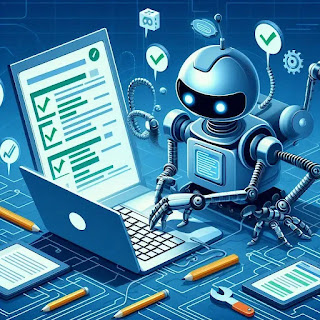AI-Generated Tests: Revolutionizing Software Quality Assurance
What Are AI Generated Tests?
AI-generated tests refer to automated test cases created
using artificial intelligence algorithms, reducing manual effort and enhancing
test coverage. These tests analyze application behavior, code changes, and user
interactions to predict potential issues, ensuring more robust software
delivery.
How AI Generates Test Cases
AI generates test cases by analyzing code patterns,
historical data, user behavior, and system interactions to predict potential
issues and edge cases.
Machine Learning Algorithms
Machine learning algorithms process large datasets from
previous test runs, identifying patterns and trends that help generate
accurate, context-aware test cases.
Pattern Recognition
AI excels at recognizing recurring bugs and vulnerabilities.
By detecting these patterns, AI can automatically create tests targeting
high-risk areas, improving defect detection rates.
Behavior Analysis
AI simulates real-user interactions with the application,
generating test cases that mirror real-world usage scenarios. This ensures that
the software performs well under diverse conditions.
Benefits of AI-Generated Tests
Adopting AI-generated tests offers several advantages that
streamline development cycles and improve software quality.
Faster Test Creation
AI automates repetitive test creation tasks, significantly
reducing the time required to develop comprehensive test suites.
Improved Test Coverage
AI-generated tests cover a broader range of scenarios,
including edge cases that manual testers might overlook. This enhances the
reliability of the software.
Reduced Human Error
Automated testing minimizes human biases and
inconsistencies, ensuring more objective and thorough test coverage.
Cost Efficiency
By reducing the need for extensive manual testing,
AI-generated tests lower resource allocation and operational costs, making
testing more cost-effective.
Limitations of AI-Generated Tests
While AI-generated tests offer numerous benefits, they also
come with limitations that developers should be aware of.
Dependency on Data Quality
AI models rely heavily on the quality of input data. Poor or
insufficient data can result in ineffective or inaccurate test cases.
Complex Scenario Challenges
AI may struggle to handle highly specific or complex edge
cases that require nuanced human judgment.
Initial Setup Costs
Implementing AI-based testing tools can involve significant
initial setup costs and require specialized expertise.
Popular AI Tools for Test Generation
Several tools leverage AI to automate test case generation,
enhancing efficiency for development teams.
Keploy
Keploy is an open-source
AI-powered testing tool that generates test cases and mocks with high
accuracy. It captures real user interactions, automates test creation, and
integrates seamlessly with CI/CD pipelines.
Testim
Testim uses machine learning for functional and UI testing,
enabling teams to create stable and scalable automated tests quickly.
Applitools
Applitools is an AI-driven visual testing platform that
identifies visual discrepancies across web and mobile applications, ensuring UI
consistency.
Mabl
Mabl is an intelligent test automation tool designed for web
applications. It uses AI to create, execute, and maintain end-to-end tests with
minimal human intervention.
How Keploy Enhances AI-Generated Testing
Keploy stands out as an AI-driven tool that simplifies the
test generation process while improving test accuracy and coverage.
Automated Test Case Generation
Keploy captures real user data to create meaningful test
cases automatically, reducing the need for manual scripting and ensuring tests
reflect actual user behavior.
Seamless CI/CD Integration
Keploy integrates effortlessly with existing CI/CD
workflows, enabling continuous testing and faster release cycles. This ensures
that new code changes are thoroughly tested before deployment.
Mock Generation & Data Stubbing
Keploy reduces dependency on external APIs during testing by
generating mocks and data stubs. This improves test reliability and speeds up
execution.
Best Practices for Using AI in Test Automation
To maximize the benefits of AI-generated tests, following
best practices can significantly improve outcomes.
Regular Data Updates
Keep the AI model trained with up-to-date, high-quality data
to ensure accurate and relevant test case generation.
Combining Manual and AI Testing
While AI handles repetitive and data-driven tests
efficiently, combining it with manual testing ensures comprehensive coverage,
especially for complex scenarios.
Continuous Monitoring and Feedback
Regularly monitor AI-generated tests and provide feedback to
improve model performance. This iterative process helps refine test accuracy
over time.
The Future of AI in Software Testing
AI-generated testing is just the beginning—future
advancements promise even smarter, more adaptive QA solutions.
Predictive Testing Models
AI will evolve to predict potential software issues before
they occur, allowing proactive testing and bug prevention.
Self-Healing Test Suites
Future AI tools will feature self-healing capabilities,
automatically adapting test scripts to code changes without manual
intervention.
Advanced Natural Language Processing (NLP)
AI will simplify test creation further by understanding
natural language commands, enabling non-technical stakeholders to contribute to
test development.
Conclusion




Comments
Post a Comment